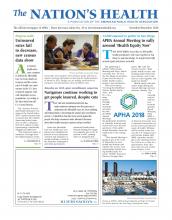The Trump administration has made numerous attempts over the past year to undermine the Affordable Care Act, from slashing advertising funds to shortening the annual open enrollment period. A critical blow has also been struck against the people who help consumers make informed decisions about their health insurance options and get enrolled.
Under the Affordable Care Act, health care navigators were established to provide no-cost education, outreach and assistance to people seeking to enroll in the insurance marketplace and other government-sponsored health plans. Federal funding for navigator programs was cut by 43 percent in 2017, putting strain on programs that guide people through the enrollment process.

From right, ACA navigator Nina Hadwen speaks with Marta Aguirre and Jorge Hernandez as they shop for health insurance in Miami in 2013. Budget cuts are making work harder for navigators and spurring fears about enrollment rates.
Photo by Joe Raedle, courtesy Getty Images
“The navigators have been through a very rough time and that is unfortunately continuing,” Eliot Fishman, PhD, senior director of health policy at Families USA, told The Nation’s Health.
Navigator grantees throughout the U.S. have been under increased pressure to serve community members with less financial support from the federal government.
“People have to work harder and smarter and cannot reach as many consumers as they have in the past,” Jill Hanken, JD, director of Enroll Virginia, told The Nation’s Health.
To fill in the gaps in service, some navigators are using complementary measures to inform consumers about health insurance enrollment. One strategy is partnering with organizations in the health care and public health sectors to offer cross-cutting support. Such is the case for the United Way of Metropolitan Chicago’s navigator program, which is leveraging community partnerships to help consumers.
“We’ve been seeing a lot of collaboration happening as a result of these (funding) cuts,” Latisha Thomas, MNA, MBA, a grant manager at the United Way of Metropolitan Chicago, told The Nation’s Health.
The organization has partnered with like-minded grassroots groups to ensure that local residents have access to holistic health services such as food and medical care, Thomas said.
At AIDS Alabama, navigators are also stretching their resources. The navigator grantee did not experience significant funding cuts last year, although it is bracing for upcoming obstacles, said Matthew Pagnotti, director of policy and advocacy at the organization. He said that AIDS Alabama will likely need more help from volunteers and other groups to get people enrolled.
Navigator programs such as AIDS Alabama may also have to cut back on in-person assistance, which could be detrimental to enrollment numbers. Offering one-on-one support is key to helping people understand all the complicated factors involved in signing up for health insurance, and could mean the difference between being covered or not, Pagnotti said.
“Without being able to provide that in-depth assistance, I’m just worried about that impact on insurance coverage,” he told The Nation’s Health.
Navigators with the Virginia Poverty Law Center are preparing for a different challenge with the advent of the state’s Medicaid expansion in 2019. Hanken, who serves as the navigator grantee’s director of the Center for Healthy Communities, said the expansion will be a boon to Virginia’s uninsured population. But such a major change will require some effort on the part of both navigators and consumers to go smoothly. More than 60,000 Virginians with marketplace plans are estimated to lose their tax credits once they become eligible for Medicaid, meaning that consumers must be vigilant about canceling their existing plans, Hanken said.
“We can’t do as much as we used to do with those significant (funding) cuts, but we will do what we can in (the sixth open enrollment period) to help consumers figure out what insurance options they have,” she said.
The coming year will see even more attacks on the Affordable Care Act, beginning in January with the repeal of the individual mandate that required all Americans to carry health insurance or pay a fine. Its loss will result in 4 million more people uninsured in 2019, according to the Congressional Budget Office.
The repeal of the individual mandate has also invoked another attempt to strip health insurance from millions of Americans. In September, a U.S. District Court heard oral arguments in a federal lawsuit that seeks to render the Affordable Care Act unconstitutional. Texas and 19 other states argue that the entirety of the health care law should be made invalid because the individual mandate will no longer be legal. APHA is part of a friend-of-the-court brief on the case, arguing that overturning the Affordable Care Act would have disastrous effects. In another case, Maryland Attorney General Brian Frosh filed a lawsuit in the U.S. District Court of Maryland seeking a declatory judgment to defend the ACA.

Health insurance navigators and other workers from Mary’s Center in Washington, D.C., help people during open enrollment in 2013. This year’s enrollment period, during which people can buy plans through the federal marketplace, opens Nov. 1
Photo by Marvin Joseph, courtesy The Washington Post/Getty Images
“If the ACA is overturned or weakened, it will have devastating consequences for the health of our nation,” said APHA Executive Director Georges Benjamin, MD, in a news release. “Millions of Americans with pre-existing conditions could lose their insurance, and the progress made to shift the emphasis of our health care system toward prevention and away from treatment would be lost.”
Continued efforts to chip away at the Affordable Care Act are leading to concerns about the potential impact on enrollment numbers.
“We still have millions of uninsured people in this country, so you have to wonder whether some of those changes at the federal level have hurt the growth in enrollment, which should be ongoing,” Katherine Hempstead, PhD, senior policy advisor at the Robert Wood Johnson Foundation, told The Nation’s Health.
Pagnotti said that consumers last year were uncertain whether the health care law was still in place, with misinformation and rhetoric about its demise widespread.
This year, consumers are worried about whether their insurance plans will soar in price or if they will even be eligible for health coverage if they have a pre-existing condition, said Katrina McGivern, director of policy and public affairs at the Kansas Association for the Medically Underserved. She also noted that the increased availability of short-term and association health plans, which do not cover all the essential health benefits under the Affordable Care Act, may complicate enrollment.
Public health advocates have criticized the plans, which are not compliant with the Affordable Care Act and may weaken the marketplace by siphoning away healthy individuals. Not only will navigators have to spend more time explaining the implications of choosing short-term and association health plans, but consumers will also be reviewing options that will not provide adequate coverage, McGivern said.
All the turmoil surrounding the Affordable Care Act could impact the Nov. 1 to Dec. 15 open enrollment period.
“It’s going to be a more complicated plan selection environment and there won’t be navigators with significant capacity to help consumers make those selections,” Fishman said.
For more information on open enrollment, visit www.healthcare.gov.
- Copyright The Nation’s Health, American Public Health Association












